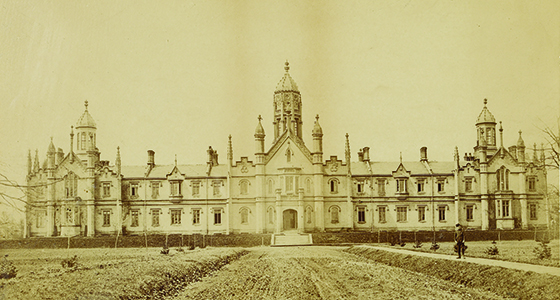
As it marks a key birthday, the Faculty of Divinity integrates a deep love of tradition with a forward-thinking mindset that puts people first.
By Jennifer Matthews
In a year where the spotlight shines brightly on Canada’s 150th birthday, there is another milestone— one that predates our country’s founding by a quarter-century— of particular importance for Trinity College. On January 10, 2017, the Faculty of Divinity turned 175.
Why this milestone matters to everyone at Trinity, past and present, is because it connects us, collectively, to the founding moment of the College itself. Trinity College’s official cornerstone was laid on April 30, 1851 by the College’s founder, the Right Reverend John Strachan, first Bishop of Toronto. But the College’s true beginnings, described by William Westfall in his book The Founding Moment: Church, Society, and the Construction of Trinity College, can be traced back nearly a decade earlier.
On January 10, 1842, Reverend Alexander Neil Bethune, Rector of Cobourg (and the man who would succeed Strachan as the second Bishop of Toronto), delivered the first lecture at the Diocesan Theological Institution. The school was born from the desire of the Church of England to ensure the sufficient education of Anglican priests in this new, rapidly growing part of the British Empire. In 1850, King’s College, which had been presided over by Strachan, was secularized by Reformists and renamed the University of Toronto.
In response, Strachan created Trinity College to serve as an Anglican university in the growing capital. In 1852, the Diocesan Theological Institution relocated its 13 Divinity students to Toronto (five others had already graduated from their training in Cobourg). Along with 18 Arts students and five Medical students, the group formed the new Trinity College.
At the forefront of a changing world
The origins of the College were, on the surface, tied to centuries of orthodox religion and tradition. And Strachan was a product of his Conservative times. But the birth of Trinity was, “really a very radical and decisive act,” writes Westfall. “Trinity was a new university that was part of a new Church of God setting out to minister to a new and changing world.”
That sense of being at the forefront of change is a theme that has continued through the Faculty of Divinity’s history, says Adjunct Professor Jonathan Lofft. “Divinity is still outstanding at what it does. As a Faculty, it has managed to maintain many of its traditions, while evolving in ways that are really important to the modern world.”
At the turn of the century, Trinity entered into federation with the University of Toronto. Divinity was the only faculty that retained the power to grant degrees under the new structure. Several decades later the faculty became a founding seminary of the Association of Theological Schools of the United States and Canada. Through that body, Divinity helps to define and uphold the standards of theological education throughout the continent—a role one can assume would have made John Strachan proud.
In keeping with its progressive role, Divinity integrated women into its classrooms beginning in the early 1940s (it would take three more decades for the Anglican Church to permit the ordination of women as priests).
Over the years the student body has evolved in other ways as well, welcoming more international students, and introducing an Orthodox Christianity program in 2006. “Trinity has always made room for other voices in theology,” says Lofft. And ordainment is only one of several paths today’s Divinity students choose, says Dean of Divinity and Margaret E. Fleck Chair in Anglican Studies David Neelands. “Since the Second World War our students have also pursued doctoral work, general theological education for personal interest, or preparation for professional work, including both congregational ministry and chaplaincy.”
A recent example of the way the Faculty of Divinity honours tradition while leading by progressive example happened earlier this year, when Dean Neelands was one of the official presenters of Bishop Kevin Robertson, the first openly partnered gay man to be made a bishop in Canada. Calling it “a wonderful moment,” Neelands shrugs off the suggestion of his involvement as particularly progressive. “The world is moving. The Church is moving. Getting rid of bad narratives is part of our work,” he says. “We may value traditions at Trinity, but people have always come above those.”

Sorry, comments are closed for this post.